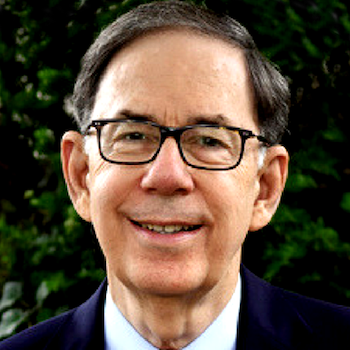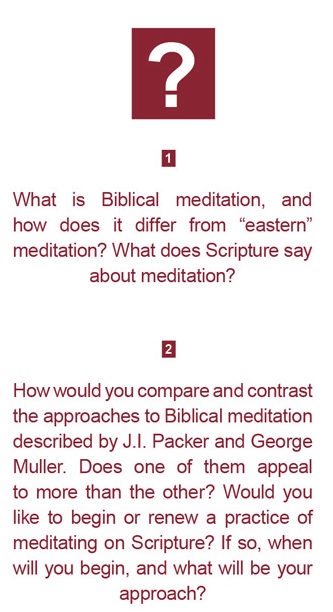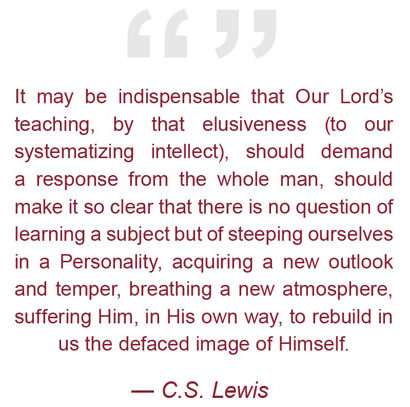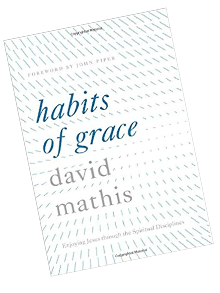Back to series

Recommended Reading:

Biblical Meditation
Click here to open a Print-Friendly PDF
Meditating on the Scriptures is vital practice for maturing in the Christian life. As one anonymous writer said, “The Bible is not meant merely to inform but to transform.” Throughout history, godly leaders have commended the transforming effects of meditation. Consider this beautiful description by Thomas Brooks, a seventeenth-century church leader:
Remember that it is not hasty reading but serious meditation on holy and heavenly truths, that makes them prove sweet and profitable to the soul. It is not the mere touching of the flower by the bee that gathers honey, but her abiding for a time on the flower that draws out the sweet. It is not he that reads most but he that meditates most that will prove to be the choicest, sweetest, wisest and strongest Christian.
What Is Biblical Meditation?
 In the Old Testament, two Hebrew words are translated “meditate.” One suggests a low pitch muttering sound; the other means to be taken up or absorbed with something. Taken together, we get the idea of someone pondering a biblical text, quietly vocalizing it repeatedly.
In the Old Testament, two Hebrew words are translated “meditate.” One suggests a low pitch muttering sound; the other means to be taken up or absorbed with something. Taken together, we get the idea of someone pondering a biblical text, quietly vocalizing it repeatedly.
The focus of meditation is on God, His glory and majesty, His ways and works in the world. Its intended effect is to shape one’s inner life and outward behavior. Theologian J.I. Packer describes it this way:
Meditation is the activity of calling to mind, and thinking over, and dwelling on, and applying to oneself, the various things that one knows about the works and ways and purposes and promises of God… It is an activity of holy thought, consciously performed in the presence of God, under the eye of God, by the help of God, as a means of communion with God.1
In other words, meditation is a devotional practice that we engage in with God’s help to know Him better, love Him more, experience closer communion with Him, and live for His glory.
This definition illustrates the great difference between Eastern meditation and biblical meditation. As Peter Toon says,
The simplest way to highlight the difference is to say that for the one meditation is an inner journey to find the center of one’s being, while for the other it is the concentration of the mind/heart upon an external Revelation. For the one revelation/insight/illumination occurs when the inmost self (which is also the ultimate Self, the one final Reality) is reached by the journey into the soul, while for the other it comes as a result of encounter with God in and through his objective Revelation to which Holy Scripture witnesses.2
Eastern meditation, whether Transcendental Meditation or various forms of New Age meditation, is to be avoided. But biblical meditation should not be feared. On the contrary, it should be fully embraced as a valuable means of knowing God, growing in grace, being transformed into Christlikeness, and fulfilling God’s purposes for our lives.
What Does the Bible Say about Meditation?
Let’s briefly look at a few Bible verses about meditation and its importance in the believer’s life. When God commissioned Joshua to lead the Israelites into the promised land, He said, “This Book of the Law shall not depart from your mouth, but you shall meditate on it day and night, so that you may be careful to do according to all that is written in it. For then you will make your way prosperous, and then you will have good success” (Josh. 1:8).3
For Joshua to be successful in what God had called him to do, he needed to immerse himself in God’s Word and faithfully put it into practice, thereby growing in the knowledge of God and experiencing divine enablement. This ancient truth is as applicable today as it was then.
The theme of meditation recurs in the Psalter, which begins with Psalm 1 declaring the blessedness of the one
who walks not in the counsel of the wicked… but his delight is in the law of the Lord, and on his law he meditates day and night. He is like a tree planted by streams of water that yields its fruit in its season, and its leaf does not wither. In all that he does, he prospers. (1:1–3)
 This is a picture of one who is devoted to God and delights in saturating oneself in God’s Word and applying it in daily life. The result is a life of fruitfulness in which this person prospers in whatever God appoints for him or her to do.
This is a picture of one who is devoted to God and delights in saturating oneself in God’s Word and applying it in daily life. The result is a life of fruitfulness in which this person prospers in whatever God appoints for him or her to do.
There are many other references to meditation in the psalms. Psalm 119, for example, extolls God’s Word and repeatedly mentions meditation. In Psalm 145:5, David highlights the specific points of meditation, “On the glorious splendor of your majesty, and on your wondrous works, I will meditate.”
In the New Testament, Jesus gives us a striking example of someone who saturated Himself in God’s Word by memorizing and meditating on it deeply.
This is evident in the way He responded with Scripture to the devil’s temptations after His baptism and in His ready recall and skillful use of Scripture throughout His subsequent ministry, even citing it as He hung on the cross.
Jesus illustrates for us the vital importance of meditating on God’s Word in order to be successful in fulfilling God’s purposes.
This same saturation in Scripture is also evident in the life of the apostle Paul, who quoted Scripture constantly in his epistles and encouraged believers to “let the word of Christ dwell in you richly” (Col. 3:16).
A careful study of how Jesus and Paul used Scripture reveals that they had not simply read a lot of Bible verses or even memorized them; rather, they had gone on to meditate deeply and understand their meaning. That treasury of truth enabled them to use God’s Word in an accurate way in whatever situations they encountered.
This solid grasp of God’s Word, empowered by His Spirit, is what we need today if we are to successfully navigate life in a fallen world in which we are challenged daily by our own flesh and the schemes and temptations of the devil.
Meditation provides essential resources for a wise and godly life and enables us to “above all else, guard your heart, for everything you do flows from it” (Prov. 4:23 NIV). Failure to meditate on God’s Word, to be taught by Him and commune with Him, leaves our hearts unguarded and spiritually impoverished, and that affects “everything you do.”
How Do We Learn to Meditate?
Unlike Eastern meditation, there is no hint in the Bible that meditation is an esoteric practice that requires instruction by gurus and special techniques for controlling one’s breathing, repeating mantras, descending inward, etc. Rather, the Bible’s picture is of an activity that is straightforward and accessible to every believer.
Although the Bible does not give any specific instructions or models to guide us, the Hebrew words for meditation, along with Packer’s definition, cited above, give us enough to find our way into the practice. Below I cite two similar but slightly different approaches from Bible-believing, evangelical leaders: J.I. Packer and George Müller. Packer gives a compact approach used since ancient times; Müller gives a down-to-earth, encouraging narrative account of how he learned to meditate, with examples of its positive impact. I trust, one of these methods will provide a good starting point for you.
Lectio Divina
 J.I. Packer notes that Lectio Divina (Divine Reading) was introduced in the sixth century by Saint Benedict and his followers. This form of meditation and prayer comprised several steps by which they focused on a particular text, thinking about it from various angles, pray with it, to draw out God’s message to them through that passage. This modified form of Lectio Divina can help you absorb the important teachings of a particular text.
J.I. Packer notes that Lectio Divina (Divine Reading) was introduced in the sixth century by Saint Benedict and his followers. This form of meditation and prayer comprised several steps by which they focused on a particular text, thinking about it from various angles, pray with it, to draw out God’s message to them through that passage. This modified form of Lectio Divina can help you absorb the important teachings of a particular text.
Silence
Take time to be silent: prepare to communicate with God as He expresses Himself to you in the passage of Scripture you have chosen. After a period of quiet, ask God’s help as you enter this session of meditative prayer.
Read
Read a short passage of Scripture aloud several times slowly. Allow its words and meanings to sink into your soul.
Meditate
Meditation is like chewing. It is slow and thorough. Write notes about what you see in this passage. Make connections between the various sections. Ask yourself, “What do these words from God say?” “What do they mean?” Place who you are and what you do next to this passage and ask God to examine you. Continue to write your findings.
Prayer
Pray using the passage as an outline for your prayer. Read the passage phrase-by-phrase, responding to God after each phrase or verse.
Contemplation
Wait in stillness once more. Ask that God bring to your mind any areas of your life that you need to shape more closely to His design as revealed in this passage. Contemplate God’s love and power as it is revealed here.
Live It Out
What precisely ought you to be believing, thinking, and doing as a result of this passage? Make notes about how you hope to bring these words from Jesus into your current practice.
Meditating on God’s Word
 George Müller said, While I was staying at Nailsworth, it pleased the Lord to teach me a truth, irrespective of human instrumentality, as far as I know, the benefit of which I have not lost, though now… more than forty years have since passed away.
George Müller said, While I was staying at Nailsworth, it pleased the Lord to teach me a truth, irrespective of human instrumentality, as far as I know, the benefit of which I have not lost, though now… more than forty years have since passed away.
The point is this: I saw more clearly than ever, that the first great and primary business to which I ought to attend every day was, to have my soul happy in the Lord. The first thing to be concerned about was not, how much I might serve the Lord, how I might glorify the Lord; but how I might get my soul into a happy state, and how my inner man might be nourished.
For I might seek to set the truth before the unconverted, I might seek to benefit believers, I might seek to relieve the distressed, I might in other ways seek to behave myself as it becomes a child of God in this world; and yet, not being happy in the Lord, and not being nourished and strengthened in my inner man day by day, all this might not be attended to in a right spirit.
Before this time my practice had been, at least for ten years previously, as an habitual thing, to give myself to prayer, after having dressed in the morning. Now I saw, that the most important thing I had to do was to give myself to the reading of the Word of God and to meditation on it, that thus my heart might be comforted, encouraged, warned, reproved, instructed; and that thus, whilst meditating, my heart might be brought into experiential communion with the Lord. I began therefore, to meditate on the New Testament, from the beginning, early in the morning.
The first thing I did, after having asked in a few words the Lord's blessing upon His precious Word, was to begin to meditate on the Word of God; searching, as it were, into every verse, to get blessing out of it; not for the sake of the public ministry of the Word; not for the sake or preaching on what I had meditated upon; but for the sake of obtaining food for my own soul. The result I have found to be almost invariably this, that after a very few minutes my soul has been led to confession, or to thanksgiving, or to intercession, or to supplication; so that though I did not, as it were, give myself to prayer, but to meditation, yet it turned almost immediately more or less into prayer.
 When thus I have been for awhile making confession, or intercession, or supplication, or have given thanks, I go on to the next words or verse, turning all, as I go on, into prayer for myself or others, as the Word may lead to it; but still continually keeping before me, that food for my own soul is the object of my meditation.
When thus I have been for awhile making confession, or intercession, or supplication, or have given thanks, I go on to the next words or verse, turning all, as I go on, into prayer for myself or others, as the Word may lead to it; but still continually keeping before me, that food for my own soul is the object of my meditation.
The result of this is, that there is always a good deal of confession, thanksgiving, supplication, or intercession mingled with my meditation, and that my inner man almost invariably is even sensibly nourished and strengthened and that by breakfast time, with rare exceptions, I am in a peaceful if not happy state of heart.
Thus also the Lord is pleased to communicate unto me that which, very soon after, I have found to become food for other believers, though it was not for the sake of the public ministry of the Word that I gave myself to meditation, but for the profit of my own inner man.
The difference between my former practice and my present one is this. Formerly, when I rose, I began to pray as soon as possible, and generally spent all my time till breakfast in prayer, or almost all the time. At all events I almost invariably began with prayer… But what was the result? I often spent a quarter of an hour, or half an hour, or even an hour on my knees, before being conscious to myself of having derived comfort, encouragement, humbling of soul, etc.; and often after having suffered much from wandering of mind for the first ten minutes, or a quarter of an hour, or even half an hour, I only then began really to pray.
I scarcely ever suffer now in this way. For my heart being nourished by the truth, being brought into experiential fellowship with God, I speak to my Father, and to my Friend (vile though I am, and unworthy of it!) about the things that He has brought before me in His precious Word.
It often now astonished me that I did not sooner see this. In no book did I ever read about it. No public ministry ever brought the matter before me. No private conversation with a brother stirred me up to this matter. And yet now, since God has taught me this point, it is as plain to me as anything, that the first thing the child of God has to do morning by morning is to obtain food for his inner man.
As the outward man is not fit for work for any length of time, except we take food, and as this is one of the first things we do in the morning, so it should be with the inner man. We should take food for that, as every one must allow. Now what is the food for the inner man: not prayer, but the Word of God: and here again not the simple reading of the Word of God, so that it only passes through our minds, just as water runs through a pipe, but considering what we read, pondering over it, and applying it to our hearts…
I dwell so particularly on this point because of the immense spiritual profit and refreshment I am conscious of having derived from it myself, and I affectionately and solemnly beseech all my fellow-believers to ponder this matter. By the blessing of God I ascribe to this mode the help and strength which I have had from God to pass in peace through deeper trials in various ways than I had ever had before; and after having now above forty years tried this way, I can most fully, in the fear of God, commend it. How different when the soul is refreshed and made happy early in the morning, from what it is when, without spiritual preparation, the service, the trials and the temptations of the day come upon one!5
 A few concluding comments may be helpful as you pursue meditation on God’s Word.
A few concluding comments may be helpful as you pursue meditation on God’s Word.
1. Meditation is not the same as inductive study of the Bible, and its purpose is not preparation for teaching or preaching. As stated above, meditation is a devotional reading of the Scripture with the ultimate goal of drawing closer to God and Jesus. It is important to be clear about this distinction. (Both of these approaches are valuable for spiritual growth.)
2. Meditation, as is true with prayer, worship, or other religious exercises, will have limited value if the motivation of one’s heart is not right. David guides us here: “I remember the days of old; I meditate on all that you have done; I ponder the works of your hands. I stretch out my hands to you, my soul thirsts for you like a parched land” (Ps. 143:5–6). The basic orientation of David’s heart is one of thirst for God, a strong desire for communion with God through His Word. That should be true of us as well. If it isn’t, we can ask God to make it so.
3. Although communion with God through His Word is a mental activity involving focused thought, this communion is mediated by the Holy Spirit’s inward illumination of the Word. Thus prayer for the Spirit’s help is a vital part of the practice. Some days, this will be accompanied by an elevation of feelings, at other times, not; but communion with God cannot be measured by one’s feelings.
4. As with many things, unless you believe meditation will be valuable to you, you probably won’t persist long enough to develop the practice and reap its benefits (especially if meditation is new to you). Look up the biblical passages that speak of meditation and ask God to help you see its importance and strengthen your desire to practice it. Then stick with it over time to gain the benefits.
5. Blaise Pascal observed that “all the troubles of life come upon us because we refuse to sit quietly for a while each day in our rooms.” He echoes David, who said, “For God alone, O my soul, wait in silence, for my hope is from him” (Ps. 62:5). Meditation requires a measure of discipline to sit quietly before God. If we are convinced of the value of meditation, we must prioritize it in order to provide a foundation for discipline.
6. For many, a significant hindrance will be busyness. In today’s fast-paced, stress-filled, high-pressure world, life is hectic and time is at a premium. Meditation takes more time out of our already overloaded schedule. A.W. Tozer’s observation is helpful, “We Christians must simplify our lives or lose untold treasures on earth and in eternity.
Modern civilization is so complex as to make the devotional life all but impossible. The need for solitude and quietness was never greater than it is today.”6 This highlights the need to find a time to meditate when you will not be in a rushed state of mind and feeling pressed to quickly move on to the next thing.
7. I conclude with a summary of the basic steps given above (plus a few others) to guide your time of meditation: find a quiet place where you will not be distracted and allow twenty to thirty minutes for meditating. Bring your Bible, a notebook, and a pen. To avoid becoming drowsy, avoid beds, overstuffed chairs and sofas; sit in a chair with an upright back. Open your time with prayer, asking God to meet you. If you are new to meditation, start small — perhaps one time a week — and live with the text for the whole week, recalling and pondering it periodically. Most people find it helpful to memorize the text and read it aloud several times, which was the ancient practice and is still widely used today. Select your text from your daily Scripture reading or a passage that speaks to an important need or concern in your life. How large should the chosen text be? Anywhere from one verse to several or possibly a brief parable or story of Jesus. Note anything that applies to your life, and resolve to make whatever changes are necessary. Conclude your meditation by giving thanks to God.
|
Notes: |
|||

Thomas A. Tarrants
Author, President Emeritus, CSLI Thomas A. Tarrants is President Emeritus of the C.S. Lewis Institute. After serving twelve years as president and nine years as vice President, he retired from his position as Vice President for Ministry and Director, Washington Area Fellows Program, with CSLI in June 2019. He holds a Master's of Divinity Degree, as well as a Doctor of Ministry Degree in Christian Spirituality. Tom is an ordained minister in the Evangelical Church Alliance and a member of the Evangelical Theological Society. He spends his time writing, mentoring, consulting and traveling. His life story is told in Consumed by Hate, Redeemed by Love, published by Thomas Nelson Publishers.Recommended Reading:
David Mathis, Habits of Grace: Enjoying Jesus through the Spiritual Disciplines (Crossway, 2016)
Hear his voice. Have his ear. Belong to his body. Three seemingly unremarkable principles shape and strengthen the Christian life: listening to God’s voice, speaking to him in prayer, and joining together with his people as the church. Though often viewed as normal and routine, the everyday “habits of grace” we cultivate give us access to these God-designed channels through which his love and power flow — including the greatest joy of all: knowing and enjoying Jesus.
After serving eight years of a thirty-five-year sentence, Tom attended college, moved to Washington, DC, and became co-pastor of a racially mixed church. He went on to earn a doctorate and became the president of the C.S. Lewis Institute, where he devoted himself to helping others become wholehearted followers of Jesus. A dramatic story of radical transformation, this book demonstrates that hope is not lost even in the most tumultuous of times, such as our own.
 COPYRIGHT: This publication is published by C.S. Lewis Institute; 8001 Braddock Road, Suite 301; Springfield, VA 22151. Portions of the publication may be reproduced for noncommercial, local church or ministry use without prior permission. Electronic copies of the PDF files may be duplicated and transmitted via e-mail for personal and church use. Articles may not be modified without prior written permission of the Institute. For questions, contact the Institute: 703.914.5602 or email us.
COPYRIGHT: This publication is published by C.S. Lewis Institute; 8001 Braddock Road, Suite 301; Springfield, VA 22151. Portions of the publication may be reproduced for noncommercial, local church or ministry use without prior permission. Electronic copies of the PDF files may be duplicated and transmitted via e-mail for personal and church use. Articles may not be modified without prior written permission of the Institute. For questions, contact the Institute: 703.914.5602 or email us.
-
Recent Podcasts
The Faith of Francis Schaeffer
by Arthur W. Lindsley, Aimee Riegert on October 18, 2024Francis August Schaeffer was born on January 30,...Read More
-
A Cumulative Case for God – Dr. John Studebaker’s story
by John Studebaker on October 11, 2024
-
C.S. Lewis on Faith and Reason
by Aimee Riegert, Arthur W. Lindsley on October 4, 2024
-
Recent Publications
Will You Be Ready?
by Thomas A. Tarrants on October 23, 2024Tom Tarrants gives insights on how we can...Read More
-
Should Christians Be Involved with Politics?
by Kerry A. Knott on October 1, 2024
-
Isn ’t Atheism Based on Scientific Fact Whereas Christianity is Based on “Faith”?
by Cameron McAllister on September 1, 2024
0
All Booked
0.00
All Booked
0.00
All Booked
23123
GLOBAL EVENT: Success Just For Women with Lynne Marie Kohm, J.D. 8:00 PM ET
https://www.cslewisinstitute.org/?event=global-event-success-just-for-women-with-lynne-marie-kohm-j-d-800-pm-et&event_date=2024-10-24®=1
https://www.paypal.com/cgi-bin/webscr
2024-10-24

Next coming event
Days
Hours
Minutes
Seconds
GLOBAL EVENT: Success Just For Women with Lynne Marie Kohm, J.D. 8:00 PM ET
On October 24, 2024 at 8:00 pmSpeakers

Thomas A. Tarrants
Author, President Emeritus, CSLI
Team Members







